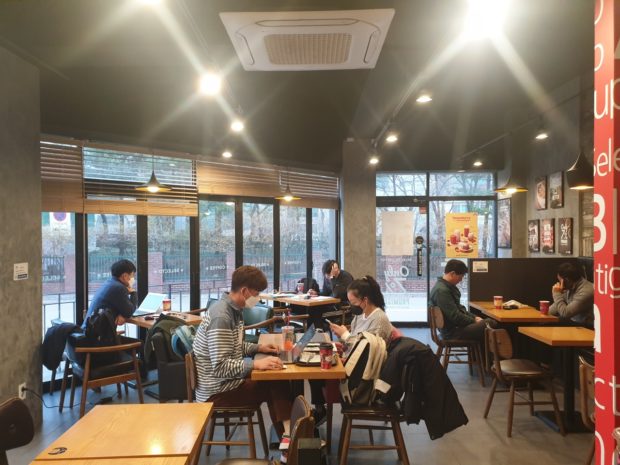Conflicts emerge in family relationships as COVID-19 crisis prolongs

Though the COVID-19 outbreak continues, a coffee shop in Seongnam, Gyeonggi Province, has a steady turnout of customers. (Park Yuna/The Korea Herald)
SEOUL — Kim Yong-chul, a university graduate, has spent most of his time at home applying for jobs and studying for tests since late last year. But as the novel coronavirus has hit the country, in a crisis so far extending some two months, he has started to feel uneasy staying with his family at home for nearly 24 hours a day.
“My father is working from home for over a month now, and it has become stressful for me to stay at home, even having three meals all together every day” Kim said. “Whenever I come into my father’s sight at home, he tries to ask me how I am preparing to get a job.”
As cases of COVID-19 infection began to snowball last month, and clusters of infection continue to emerge across the country, those who stay at home as part of self-quarantine measure are enduring conflicts with family members.
At first, some anticipated changes in their lives with a thought that they would get to spend more time with family members who may have felt neglected due to busy daily life. However, as the viral infection continues into more than two months, they are gradually starting to feel uneasy at home.
A 34-year-old architect, who wished to remain anonymous, goes to a coffee shop every weekend to avoid contact with family.
Article continues after this advertisement“All my family members stay at home over the weekend these days, and my parents would knock on the door to ask what I am doing and have a talk with family, which makes me want to escape from home sometimes.” he said. “So I go to a cafe nearby with my own things to do.”
Article continues after this advertisementPark Ye-ji, a part-time worker at Selecto Coffee in Seongnam, Gyeonggi Province — where two new clusters of virus infections have emerged, around a hospital and protestant church — say people have been coming to the coffeehouse with laptops in tow and work to do.
“Although the infection cases are reported every day in this town, people visit the coffee shop,” Park said. “Sometimes the coffee shop is filled with customers even on the weekdays.”
Kim Young-min, a freelance travel writer, began to juggle her work and taking care of her 4-year-old daughter, whose day care center has temporarily closed. As her child requires her presence, Kim decided to spend most of her time in the day for her daughter, while focusing on work at night, mostly from 11 p.m. to 2 a.m.
“Every day is exhausting these days. It could sound easy to work at home staying with a baby, but work is work. You need to focus on it,” she said. “I feel like I have become too sensitive about what is happening around me, which leads to conflicts and arguments with my husband. All the words he says sound like nagging at me.”
Na Hae-jin, who has worked at a publishing company for 10 years, has worked from home for three weeks. At first, she was confused about her dual roles at home – as a mother of 5-year-old son and a marketer.
“I am a working mom, so I am not used to spending every weekday with my child,” Na said.
“On the first week of working from home, I used to take out my anger on my child, which I regretted afterwards. But I could not help myself,” Na said.
Han Sae-young, a professor of child development at Ewha Womans University, suggests it is important for kids to maintain a regular routine in order to avoid excessive irritation. It can also prevent them from demanding too much from their parents.
“I would suggest parents make sure their kids are going around a regular time schedule as if they are at school and explain that parents themselves also have work to do,” Han said. “And at leisure time, play with the children doing what they can do at home, such as playing a board game to build rapport to communicate with each other better.”
Some experts say family members tend to easily hurt each other’s feelings because they are aware that relationships between them do not typically break apart like those between friends or lovers may.
“I would advise people that they consciously avoid using negative words to family at this difficult time,” said Gwak Geum-ju, a professor of the department of psychology at Seoul National University. “Also, they need to be aware that family members need their own time, and the social distancing is also required at home sometimes.”
For more news about the novel coronavirus click here.
What you need to know about Coronavirus.
For more information on COVID-19, call the DOH Hotline: (02) 86517800 local 1149/1150.
The Inquirer Foundation supports our healthcare frontliners and is still accepting cash donations to be deposited at Banco de Oro (BDO) current account #007960018860 or donate through PayMaya using this link.